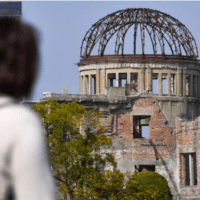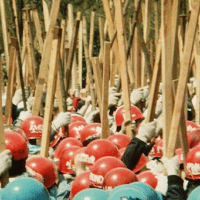-
Debt ceiling hypocrisy: U.S. boosts military budget while restricting food stamps for poor
U.S. politicians from both parties agree: the deficit doesn’t matter. In their bipartisan deal to raise the debt ceiling, Biden and Republicans are boosting military spending to $886 billion while making it harder for poor people to receive food stamps and welfare.
-
The Group of Seven should finally be shut down: The Twenty-First Newsletter (2023)
During the May 2023 Group of Seven (G7) summit, the leaders of Canada, France, Germany, Italy, Japan, the United Kingdom, and the United States visited the Hiroshima Peace Memorial Museum, near where the meeting was held.
-
The splendor of a thousand suns: Hiroshima and imperial forgetfulness
Joe Biden’s visit to Hiroshima in the framework of the G7 once again brings to the surface the cynical memory of an empire that 78 years ago unleashed the power of “a thousand suns” on a defenseless population.
-
Japan needs to reconsider wastewater discharge plan
It may be recalled that after Japan alarmingly announced in April 2021 its plan to start releasing around 1.3 million metric tons of contaminated wastewater from the destroyed Fukushima nuclear plant into the sea, countries in the rest of eastern Asia and the Pacific region protested. Environmental groups and even the Japanese people opposed it.
-
The U.S. is trying to persuade China to commit suicide
The U.S. knows from its experience in defeating Germany, Japan, and the “Asian Tigers,” that a decisive way to slow a competitor’s growth rate is to get it to reduce its level of investment, which is what it is now trying to do to China.
-
The West no longer World leaders in 84% of critical technologies
Kailath, originally from Kerala but settled in the U.S., is one of the foremost names in the world in communications, control and signal processing. I remembered his words while reading the recent startling headlines that China has become the world leader in 37 of 44 critical technologies evaluated by the Australian Strategic Policy Institute (ASPI).
-
Arms imports to Europe surge despite Global decline
As a result of military aid from the U.S. and many European states, Ukraine became the 3rd biggest importer of major arms during 2022.
-
ACTION ALERT: NYT Book Review in denial on Japanese persecution in World War II
The Times should issue an immediate correction and apology.
-
The United States and White supremacy at war with China
In 1904, Jack London, the most celebrated American writer of the time, was sent as a reporter to cover the war between Russia and Japan.
-
Supreme Court orders reparations for sex workers serving U.S. Military
Reminiscent of Imperial Japan’s “Comfort Women,” the organized sex trade near U.S. bases in Korea involved horrendous human rights violations.
-
Fooling all the people!
Many if not most readers will be familiar with the following saying attributed to Abraham Lincoln: “You can fool all the people some of the time and some of the people all the time, but you cannot fool all the people all the time.”
-
After nuking Japan, U.S. gov’t lied about radioactive fallout as civilians died
After dropping two atomic bombs on Japan in 1945, U.S. government officials lied to the media and Congress, claiming there was “no radioactive residue” in Hiroshima and Nagasaki, that civilians did not face “undue suffering,” that it was “a very pleasant way to die.”
-
Remembering one of humanity’s worst catastrophe’s—seventy seven years on
President Harry S. Truman’s decision to drop atomic bombs on Hiroshima and Nagasaki set the groundwork for an era of U.S. global hegemony and enriched corporations like General Electric, DuPont, Union Carbide, Bechtel and Westinghouse which made hundreds of billions of dollars developing generation after generation of “first-strike” nuclear weapons. U.S. leaders, intent on provoking wars with China and/or Russia, appear willing to use these weapons again—if we don’t stop them.
-
Creating cold war conditions in Asia isn’t easy
Only three weeks remain for the summit meeting of the North Atlantic Treaty Organisation (NATO) in Madrid, which is expected to unveil a new Strategic Concept aimed at redefining “the security challenges facing the Alliance and outline the political and military tasks that NATO will carry out to address them.”
-
This is not the age of certainty. We are in the time of contradictions: The Fourteenth Newsletter (2022)
It is hard to fathom the depths of our time, the terrible wars, and the confounding information that whizzes by without much wisdom. Certainties that flood the airwaves and the internet are easy to come by, but are they derived from an honest assessment of the war in Ukraine and the sanctions against Russian banks (part of a broader United States sanctions policy that now afflicts approximately thirty countries)?
-
The Fukushima taboo
“Coming out” on thyroid cancer from Fukushima is an act of bravery in today’s Japan
-
A-bomb survivors play “profound role” in COVID pandemic: U.S. scholar
Survivors of the atomic bombings in Japan have a “profound role” to play in catastrophes such as the coronavirus pandemic, a leading American psychohistorian renowned for his studies of people under stress told Kyodo News in a recent interview.
-
Rethinking Japan’s Red Years
The New Left is generally seen globally as emerging from the aftermath of the “revelations” about Stalin in Khrushchev’s “secret speech”’ at the 20th Congress of the Communist Party of the Soviet Union in early 1956, and the reaction to the Soviet invasion of Hungary later that same year.
-
The Tokyo Olympics are in peril
The masses of Tokyo want to postpone or cancel the games, but the government says it’s the IOC’s decision, not the host country’s, sovereignty be damned.
-
More young Japanese look to Marx amid pandemic, climate crisis
As the global challenge of climate change mounts and the coronavirus pandemic magnifies economic inequalities, Karl Marx, who pointed to the contradictions and limitations of capitalism, is gaining new admirers in Japan, particularly among the young.



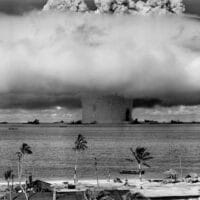
![An aerial view shows the storage tanks for treated water at the tsunami-crippled Fukushima Daiichi nuclear power plant in Okuma town, Fukushima prefecture, Japan Feb 13, 2021, in this photo taken by Kyodo. [Photo/Agencies]](https://mronline.org/wp-content/uploads/2023/04/642631c4a31057c4b4b84bb5-200x200.jpeg)




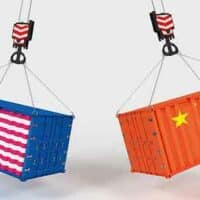

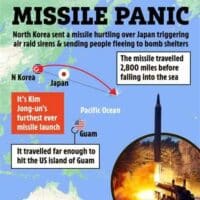
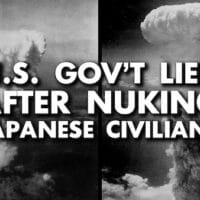
![Man stands amid ruins of Hiroshima. [Source: time.com]](https://mronline.org/wp-content/uploads/2022/08/Screen-Shot-2022-08-09-at-1.10.58-PM-200x200.png)



